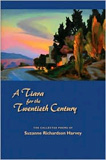January 5, 2011A TIARA FOR THE TWENTIETH CENTURY: THE COLLECTED POEMS OF SUZANNE RICHARDSON HARVEY
Review by John Freeman
Fithian Press
P.O. Box 2790
McKinleyville CA 95519
ISBN-13 978-1-56474-489-0
2009, 143 pp., $14.00
www.danielpublishing.com
Note: Suzanne Richardson Harvey passed away on July 17, 2010.
It was in my capacity as poetry editor of The Magnolia Quarterly that I was introduced to the remarkable poetry of Suzanne Richardson Harvey. As I read her submission to the magazine, what immediately caught my attention was the originality and aptness of her metaphors. Harvey presents a thoroughly cynical view of people and relationships, and her metaphors convincingly flesh out the unhappiness and dysfunction that populate the world of her poems.
In “Corporate Wife” two such images sum up the phoniness of the wife’s role playing:
She must make sure her smile is appropriately lacquered
and her ultimate loss of any meaningful “self”:
She’s a glass of wine gone sour.
“Agape: A Love Feast” unfolds a horrifying dissection of the misery two people can achieve in a long-term relationship. Her portrait of the husband is especially brutal:
A mildly deranged brontosaurus
Trumpeting his bid for triumph
Distended in the middle
Like a bloated kidney bean
Furthermore, his descent into mediocrity finds expression:
While Sonny languishes at her side
A bundle of mildewed dreams
Even the poem’s title is an ironic metaphor.
Such sentiments are typical of Harvey’s poems. These relationships are dysfunctional because the people in them are hopelessly maladjusted, and Harvey continues her metaphorical wizardry in depicting them. In “Shadow in an Anorexic Glass” the protagonist marvels:
My ribs are needles now
Sharp and exquisitely fine
Soon I shall be a sheet of cellophane
On the other hand, the speaker in “Topography for a Bulemic” explains:
A starved heart is the cistern
I empty daily
With a finger tip.
The down-and-out make their appearance in “Sirocco: Wind Song for the Homeless on Market Street”:
The Hefty bag in their Safeway cart shrinks
Like gums in a toothless skull
And the sociopath in “Case History of a Terrorist” even infects his pet Doberman with his violent insanity:
…he filed its incisors
Till they carved an abyss the size of a grenade
In the field of the nursery floor
Inevitably, in this environment of unhinged psyches, the urge to commit suicide crops up here and there. In “Aborting the Launch” a desperate girl, who is about to leap from the Golden Gate Bridge, is viewed by the speaker in a chillingly dispassionate manner:
She’s the letter in your Out basket
Forward—No Longer At This Address
And in “The Velvet Garrote” a sister who is taking care of her aging mother feels that her brother doesn’t do his share. In a passive-aggressive rage, she pours herself into her martyrdom in order to inflict guilt on him because:
I was reading Freud the other day
He says guilt can drive a man straight off the Golden Gate Bridge.
which she obviously thinks would be his just desserts.
These poems abound not only with psychological disorders, but also with the physical deterioration of aging. In “An Elegy to My Abdomen” her sagging stomach reminds the speaker of:
…that can of imported Brie
Her son’s future father-in-law blessed her with
The one whose lid exploded
Released an odor that insulted the air
Like the remains of last week’s experiment
In Chem 101
The protagonist of “Aging on the Island of the Young” finds herself surrounded by the energetic capacities of youth:
In a land where collagen rules
The lynx sprints with greatest zest at dusk
The swan glides with full throated grace on the kiss of evening air
The mind as well as the body is affected, as in “A Stranger Called Alzheimer”, where the speaker forgets how to get home:
…the steps to my apartment
Are a Chinese puzzle
The power of Harvey’s metaphors invests these people and their situations with a crushing realism and immediacy. In fact, if there is such a thing as a “flaw” in this book, it is that there is little relief provided from the unrelenting suffering; the misery builds in intensity poem to poem with a cumulative effect. Therefore I am wary of recommending the book to anyone struggling with depression, as it seems a number of readers of poetry are. However, those who can handle an unblinking look at many of the stark and often violent torments to which humanity is subjected will discover that Harvey has transformed such agony into true art.